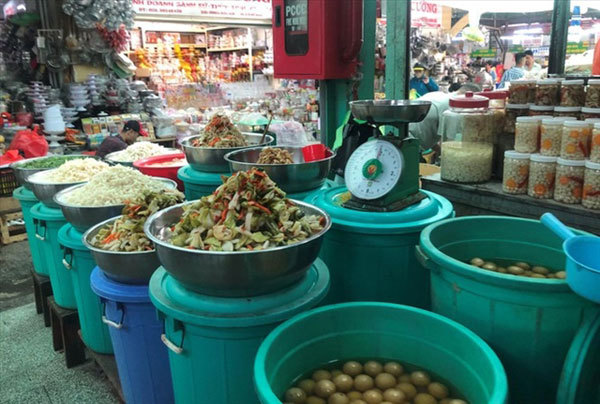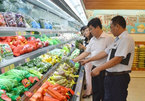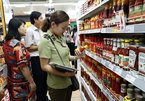 |
| Pickled onion and pickled small leeks – a popular traditional disk in Tet parties are sold at Binh Tay Market in HCM City. Photo tienphong.vn |
However, some homemade food on sale at this time of year has failed to meet food safety requirements, posing risks to consumers’ health.
At Binh Tay Market in HCM City’s District 6 last Sunday, a Tiền Phong (Vanguard) newspaper reporter who introduced herself as an online food seller was offered pickled onion and pickled small leeks – a popular traditional dish for Tet parties.
The seller at the market said she sold the food to online sellers who would then claim it was made at home by themselves or their relatives.
Dried fruits – another popular Tet snack – are also displayed in markets across the country. The dried fruits look very eye-catching, smell good and taste good too but are rarely labelled properly.
With little information about the products’ origin, consumers are forced to trust the sellers and their advertisements.
Nguyen Thi Huong, a bank worker in HCM City’s District 3, said she usually ordered food online and had it delivered to her office.
“I usually buy food from those I know or those my colleagues introduce. However, in some cases, I was delivered spoiled food and the sellers insisted that was because I stored it incorrectly,” she said.
“It’s risky to buy such homemade food,” she said, adding that once she was not satisfied with the food, she would not buy from the supplier again.
Doctor Duong Thi Kim Loan, head of the Clinic Nutrition Department under HCM City-based Thong Nhat Hospital, said consumers should be more cautious with food which is not labelled or is labelled without proper information like the producer, production date and expiration date.
Loan said that many people tended to overuse colour additives, preservatives or flavours to make their food eye-catching.
“Some people even use chemicals to protect food from insects, which could harm or poison consumers,” Loan added.
Head of HCM City’s Food Safety Management Board Pham Khanh Phong Lan told Tiền Phong that once homemade food was sold to people, producers must meet food safety requirements, detail the ingredients, use no banned substances and label their products with information like production and expiration dates.
To sell homemade food, people must fulfil their obligations to State and public, for example, licences granted by authorities, Lan said.
When consumers had problems with homemade food, they rarely sent their complaints to authorities because of insufficient information, Lan said.
Most of the homemade food producers supply food seasonally to order and didn't bother to get business licences, which made authorities struggle to trace them and examine the quality of their food, Lan said.
“Authorities will inspect and punish food producers who reportedly violate food safety regulations. However, consumers should know how to protect themselves first,” she said, calling on consumers to pay attention to food origins and possible harms to their health when they consume food with unclear origins. VNS

Food safety control to be enhanced in Vietnam
Management and unscheduled inspections of food safety and hygiene should be enhanced with stricter measures as the COVID-19 pandemic had not yet been extinguished, said the National Steering committee on Food Safety and Hygiene.

Difficulties remain in ensuring food safety in Hanoi
Efforts to improve food service quality have spurred positive changes in the capital city of Hanoi, however, challenges remain in food safety control work, experts said.